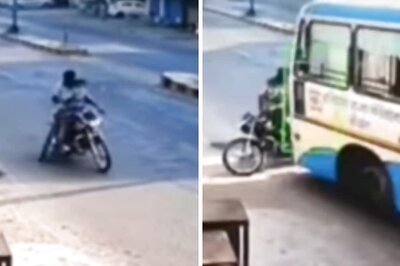
views
CHENNAI: Inspired by the organised growth of the call taxi sector from the days of yellow & black cabs, Chennai City Connect, a city-based NGO, has suggested a similar streamlining of the autorickshaw sector in a bid to curtail arbitrary charging of passengers. The suggestions are made in the ‘autorickshaw study report’ prepared by the NGO, and presented to the city transport commissioner and the RTOs. The study points out the need to deregulate the existing barriers in creating autorickshaw cooperatives or companies.By servicing around 1.5 million commuters in Chennai on a daily basis, the autorickshaws qualify as the best para-transit mode of transport by providing the last mile connectivity. But the sector has remained a highly controversial one in the city due to various political and administrative interests in the operations. Lack of government sensitivity so long to revise the fares according to the hike in petrol prices have also been a cause for the ad hoc pricing adopted by the drivers, says the report.“The fare was Rs 7 meter down for the first 2 km and Rs 3.5 per km for every subsequent kilometre in 1996. This was revised only in 2007 when it was changed to Rs 14 meter down for the first 2km and Rs 6 per km thereafter. Since 2007, the retail selling price of diesel, petrol and LPG have increased by 16.44 per cent, 12.58 per cent and 25.79 per cent respectively, as on June 2010, without any concurrent increase in fares,” notes the report. Since the deregulation that happened by the end of June 2010, the petrol prices have seen a steep increase including the `5 hike that happened earlier this month.“While we don’t have the need to argue with a call taxi operator, we go to the extent of picking fights with the auto drivers primarily due to the arbitrary rates they charge. By encouraging entrepreneurs to start a company for the auto rickshaw drivers, it is possible that the companies will ensure that a fixed price mechanism is adopted which is agreeable for the consumer and profitable for the drivers. These companies can be operated on a fixed salary basis or a revenue-sharing basis and other added incentives can be provided,” says Raj Cherubal of Chennai City Connect.“To ensure quality services, a system can be adopted wherein the auto driver is only given a payment slip at the end of the service, which he exchanges for cash at the end of the day/month from the monitoring company who will make payments only for good services,” suggests the report.“Meanwhile the government, through experts, should also arrive at a fair and scientific model for fixing the rates that takes into account all the expenditures incurred by the auto owner and also his livelihood needs. For this, auto meters should be used to calculate the distance instead of the rates so that there is no need to change the meter during periodic revision of rates,” says Raj. Such a system is already in place in cities like Mumbai where the meter monitors the distance and every driver carries a rate-per-kilometre card issued by the city authorities and they charge according to it.“In Hong Kong, for instance, paratransit vehicles like mini vans and mini buses are used to transport passengers till the metro station or bus stands providing effective and integrated transport. Such a system is possible in Chennai too if the autos and share autos are streamlined and put to use,” says Raj. But whether Chennai will learn from these global examples to improvise its transport system, only time will tell.

















Comments
0 comment